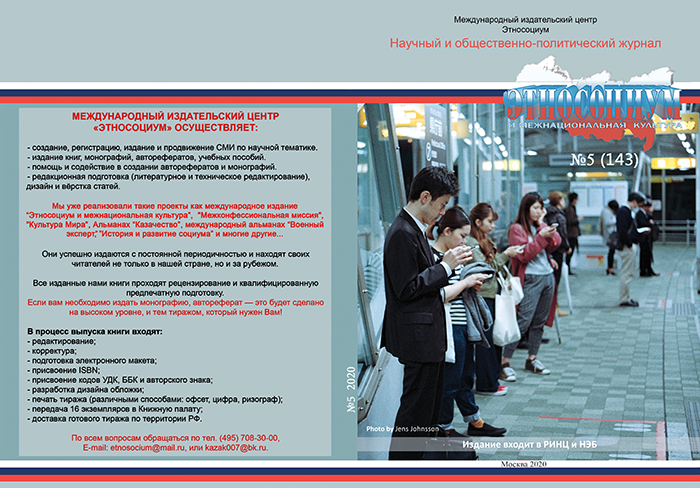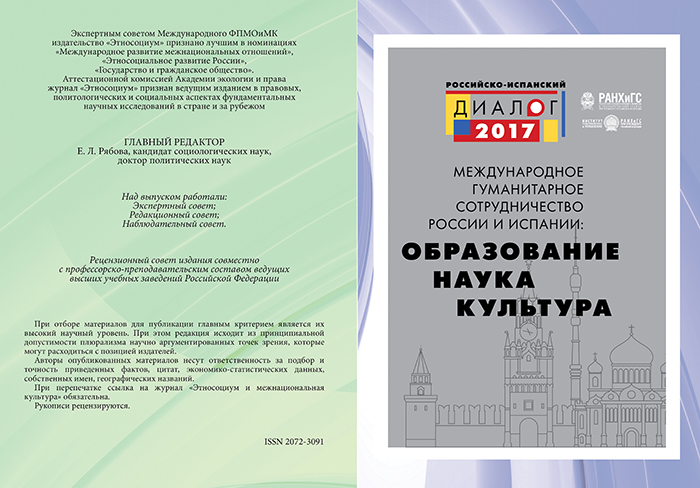

Content
|
COUNCIL OF INTERNATIONAL RELATIONSHIP
|
|
|
Komleva V.V. Export potential of Russian Higher Education
|
9
|
|
ACTUAL PROBLEMS OF MODERN SOCIETY
|
|
|
Bessonov E.G. Cyber world: a new picture of the world and the principles of ternary logic
|
23
|
|
Laminina O.G., Udovitskaya D.A., Shishova A.D., Fomin D.V. Russian market of artificial intelligence in the field of information security
|
29
|
|
REGIONAL STUDY
|
|
|
Napso M.D. Some aspects of globalization of culture
|
44
|
|
Sergeeva M.N. Experience in the development of student volunteering and training of volunteers at Tuvan State University
|
50
|
|
INTERNATIONAL RELATIONSHIPS
|
|
|
Sun Qiuhua The concept of “labor” and “wealth” in Russian and Chinese (based on proverbs and sayings)
|
58
|
|
Huseynov Ilyas Vagif oglu Stages of development and main features of diplomatic and political relations between Azerbaijan and Greece
|
66
|
|
Li Xu A study of the professional morality and ethics of teachers in Chinese higher education institutions
|
80
|
|
Julikova O.V. Factors and indicators of the accessibility of higher education for foreign citizens: approaches of Russian and Spanish researchers
|
90
|
|
Yang Bo On SCO economic cooperation priorities in the context of convergence of the Silk road Economic belt and the Eurasian economic union
|
101
|
|
Tushkov A.A. The historical prerequisites for the formation of the Japanese-American partnership in the early 20th century
|
110
|
|
CONFERENCE
|
|
|
International round table "Great Victory and the Modern World" at RANEPA
|
121
|
|
Mikhaylenko A.N. Lessons from the Great Victory and the New World Order
|
125
|
|
Abstracts
|
133
|
|
Authors
|
145
|
|
Requirements to materials submitted to the international publishing house "Etnosocium"
|
147
|
The article discusses the possibilities of Russia to implement the national project “Export of Education”. The author will single out a number of indicators that will determine the export potential of Russian education: the dynamics of interest of foreign students from different countries and regions in Russian education; the choice of forms and areas of study by foreign students, knowledge of the Russian language and others. Based on the analysis, conclusions are drawn on the regionalization of the attractiveness of Russian education, on the priority of full-time education for foreign students, on the prestige of scientific Russian schools in a number of areas, on the role of distance learning and the prospects for Russia among distance learning exporters in the world market. Based on the export models proposed by the OECD, the author shows that universities that are developing their export education strategies and tactics should become key export actors. The government should not propose unified approaches since there is no unambiguous understanding of export objectives at the state level.
Keywords: export of education, competitiveness of Russian education, international cooperation in education.
The article reveals the features of cyberspace. The media are defined as weapons of mass destruction. The emphasis is on transforming the conditions for the development of social life. The question arises about the need to describe new living conditions of society, social communication systems. It is proposed to create a model for the development of society based on ternary logic.
Keywords: society, cyberspace, ternary logic, transformation, social philosophy.
This article examines the structure of the Russian artificial intelligence market in the area of cybersecurity, identifying the main domestic manufacturers and consumers, and the course of technology development in this direction.
Keywords: artificial intelligence, information security, cybersecurity, Russian market, consumer, manufacturer, technology.
Subject of consideration of the present article is the analysis of some aspects of globalization of culture. Are researched essence and tendencies of development of global cultural trends – cultural diffusion, acculturation, cultural hybridization, cultural lagging. Influence of processes of a universalization and homogenization on development of local forms is shown. Risks of globalization for national originality, culture and tradition reveal.
Keywords: globalization, culture, tradition, originality, assimilation, cultural diffusion, homogenization.
This article reveals the activities of student volunteers on the example of the FSBEI HE Tuvan State University (hereinafter - TuvSU). The system of organization of volunteer work is described. The main problems and directions of the development of volunteer activity in a higher educational institution are considered.
Keywords: student youth, student government, volunteer movement, motives for involvement in volunteer activities, university, volunteer center.
The article analyzes the concept of “labor” and “wealth” in Russian and Chinese. It can reflect the cultural-national mentality of its carriers. The linguistic basis of the concept of “labor” is formed by meanings that indicate labor as an activity requiring effort; on the result of labor or its consequence. The concept of "wealth" in its first meaning, i.e. in its narrow aspect: large property, predominantly. monetary, a combination of material values. Russians and Chinese have a largely convergent view of a person’s attitude to work and wealth. A comparative analysis of proverbs and sayings about labor and wealth in the Russian and Chinese languages confirms the idea.
Keywords: concept of “labor” and “wealth”, comparative analysis, proverb and saying in Russian and Chinese, general worldviews, cultural and national mentality.
The article attempts to analyze the political and diplomatic evolution of relations between Azerbaijan and Greece. The purpose of the article is to study the role of Azerbaijan and Greece in establishing a kind of “bridge” between the Caucasus and the Balkans. The article discusses the dynamics of bilateral political relations between Azerbaijan and Greece from the point of view of the foreign policy vectors of these countries. The article systematizes information on the mutual visits of the heads of state that contributed to raising relations between Azerbaijan and Greece to a whole new level. The paper also outlines the main areas of cooperation between Azerbaijan and Greece within the framework of the European Union. The article focuses on high-level negotiations to ensure Europe’s energy security. Cooperation in the energy sector between countries is a priority. Greece is the first EU member country to receive natural gas from Azerbaijan under the Southern Gas Corridor project. The Southern Gas Corridor is the European Commission's flagship energy project, providing for the transportation of gas from the Caspian region through Georgia and Turkey to European countries. In this context, Greece is a strategic country for Azerbaijan. The article notes that the geostrategic importance of the Southern Gas Corridor goes far beyond the transit of Azerbaijani gas. In particular, the study touches upon the main means and methods of interaction, during which important political decisions were made. The article presents the author’s analysis of historical premises and the main reasons for political contact between Azerbaijan and Greece at the present stage. Based on the study, it was concluded that, due to the harmonious structure of relations, implying a stable political dialogue at the highest level, active inter-parliamentary relations, the implementation of specific cooperation projects in the fields of economy, culture, tourism, education and other areas, relations between countries are developing successfully.
Keywords: diplomacy, political relations, Greece, Azerbaijan, energy security, European Union.
Teachers of higher education should be the main force spreading the teaching, educating, eliminating errors, a key group serving the society. The formation of professional morality and ethics of educators should become one of the key links in this area. However, as socio-economic development, in some colleges and universities, there was a lack of synchronism between building professional pedagogical morality and morality and socio-economic development, the effectiveness of creating and focusing ethics is insufficient, there is little awareness of the importance of developing high professional ethics for teachers. Based on the requirements of the new era, teachers of higher education should deeply realize the importance of building professional teaching morality and ethics. Identifying the currently existing problems on the path to building professional teaching morality and ethics, this article provides an analysis of the causes and an assessment mechanism, and also suggests approaches to strengthen the building of teaching ethics in higher education in the new era.
Keywords: concept, problem, evaluation mechanism, features of due justice, approaches.
The accessibility of higher education is seen as the conditions for the successful export of education and enhancing Russia's position in the international educational space. The author identifies groups of key factors, among which attention is drawn to the creation of favorable conditions for the stay of foreign citizens in the country of study. A new factor is highlighted related to geopolitical and geo-economic interests. The promotion of various integration associations becomes the promotion of such interests. Within these associations, preferences are created for training students from countries participating in integration. A group of indicators of the accessibility of higher education for foreign citizens is proposed.
Keywords: accessibility of higher education, export of education, international educational space, academic mobility, foreign students.
The Chinese Initiative of the Silk Road Economic Belt is one of the most innovative manifestations in current economic regionalization and globalization trends. The Chinese Silk Road Economic Belt Initiative does not imply the creation of a regional organization for economic integration, does not pursue the goal of building a single regime. Economic cooperation is an important element of stability in the SCO space by establishing the Special Account and the Development Bank of the Shanghai Cooperation Organization (SCO), as well as facilitating and liberalizing trade and investment. This approach is generally shared by the Chinese and Russian sides. In the context of the U.S. refusal from TTP, there is an increasing role of the integration of the China Silk Road Economic Belt Initiative and the Eurasian Economic Union in the formation of a new global trade and economic institution.
Keywords: economic cooperation, convergence, Silk Road Economic Belt (SREB), Eurasian Economic Union (EEU), SCO.
In this article, the author explores the topical theme surrounding the origins of the formation and development of the Japan-U.S. partnership in the early 20th century, when imperialist Japan went from modernizing the country and reviving democratic trends in society to aggressive politics in the region and the beginning of the formation of the future Japan-American partnership.
Keywords: Northeast Asia, "Simod" treaties, Japanese satellites, Tianjin Convention, Manchuria.
A number of parallels can be drawn between the post-war era and modernity. An analysis of the Great Victory experience helps us escape mistakes of the past, to use the lessons of history in the interests of building a more effective Russian foreign policy. Today it is a very important task, because right now the formation of a new world order which is replacing the world order established by the results of World War II is taking place. Understanding this issue, based on a deep knowledge of the past, will allow Russia to take a leadership position in building a new world order.
Keywords: Great Victory, new world order, National Security Strategy, intelligence, polycentric world, historical memory, spheres of influence.